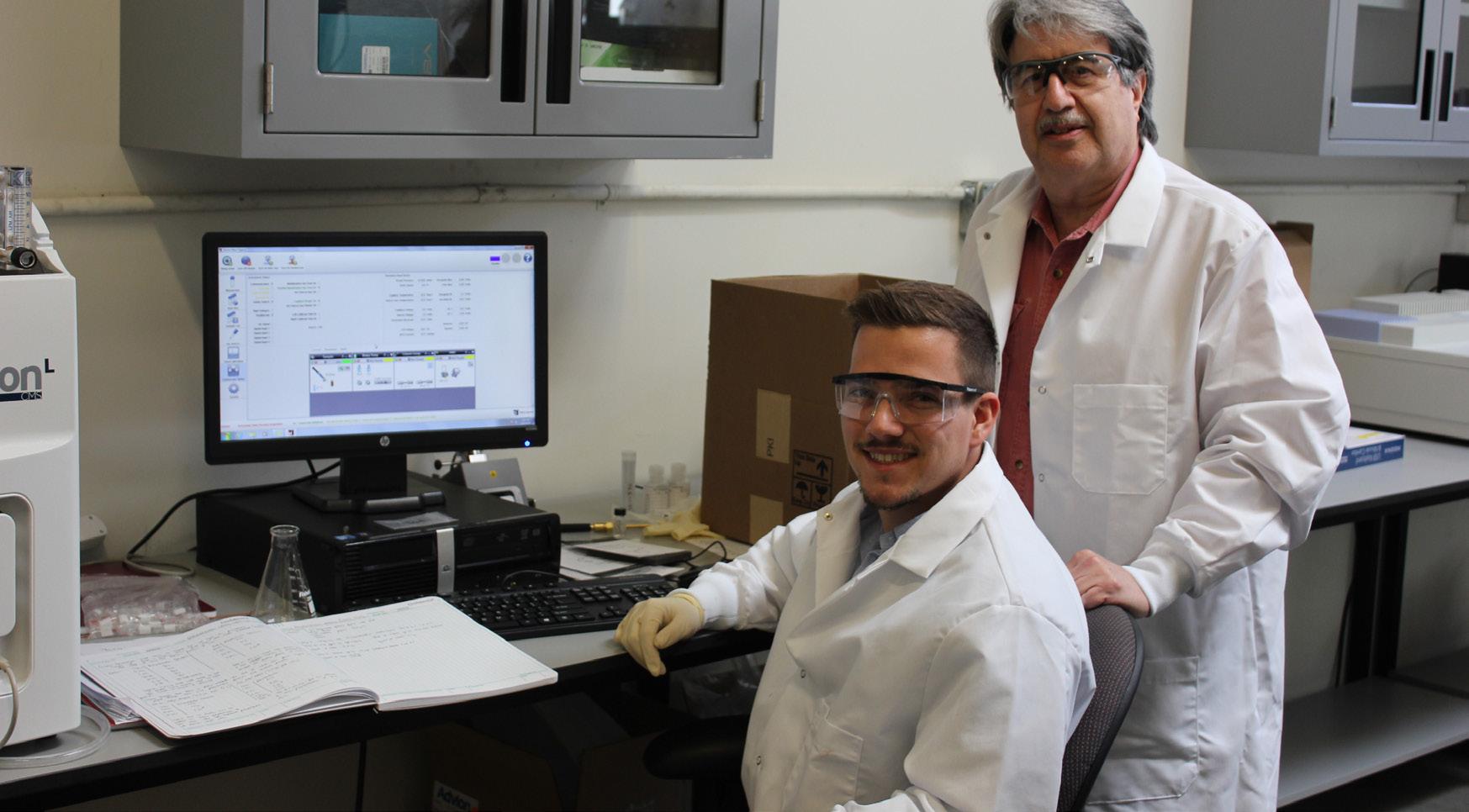
9 minute read
What is an Internship
An internship, defined at CSUCI, is any career-related work or service experience in a professional setting in which a student has specific learning outcomes and reflects actively on the learning process. The experiential learning opportunity must be supervised by professional staff who provide ongoing training for the benefit of the intern. Internships can provide real world experience to explore and gain relevant knowledge and transferable skills required to enter the working world. Internships should provide the following:
• Opportunities to work in pre-professional positions and apply their academic skills to practical work-based projects. • Intentional learning goals outlined to benefit the student through the mentorship and guidance of an expert in their industry. • Foster professional development to make networking contacts in their field of interest. • An avenue to explore different career choices, while gaining work experience specific to the student’s intended industry/ field of study.
Advertisement
Other pre-professional experiential learning opportunities and industry training programs: • Research/field/laboratory assistant programs • Leadership development programs • Fellowship with short-term work experience in nonprofit, government, or academia • Classroom-related experience such as externships, practicum, or cooperative education • Leadership training and rotational programs for recent college graduates
A well-designed internship will provide students with professionally oriented activities and experience similar to that of an entry-level professional in the field however, the student will not assume work that a regular employee would routinely perform. We insist that only 20% of tasks are administrative in nature (e.g. filing and scanning documents, answering phone lines or cold calls). About 80% of tasks should be hands-on learning opportunities for student interns to acquire new skills.
e Path of Internship Success
1 Recruiting
• career fairs • on-campus/virtual recruiting • on-campus/virtual info sessions 2 Hiring
• increased intern hiring seen in all geographic regions and industries
5 Retention
• higher retention is seen in employees who started as interns • more than 75% of employees hired as interns stay longer than 1 year • more than 62% stay 5 years or longer 4 Conversion
• 58.6% of paid interns become full-time employees • 61.2% are o ered full-time employment • 86.5% accepted o er 3 Compensation
• $16.21 Average Wage /
Engineers make the most: $20.79 • 80% of companies o er bene ts (social activities, paid holidays)
Source: 2019 NACE Internship and Co-op Survey
THE IMPORTANCE OF INTERNSHIPS
For students, internships provide an opportunity to see if a particular career path or field of study is right for them and to hone their skills. Academic credit internships integrate the students’ academic study with practical experience in cooperating organizations. Through the integration of practical and academic experience, students enhance their academic knowledge in their area of study, their personal development, and their professional preparation. The teaching faculty and the on-site supervisors share in the educational process of interns.
For employers, internships provide an opportunity to extend the interview process and evaluate the intern’s skills, work ethic, and assimilation into their culture before incurring the expense of bringing them on full time. Offering internship opportunities to CSUCI students will increase the company’s visibility on campus and in the community while supporting the organization’s goals.
WRITING AN INTERNSHIP POSITION DESCRIPTION
• Clearly outline all internship tasks, duties, responsibilities, and potential projects • Describe the training and mentorship that will be offered and what skills/experience will be gained • Describe how the skills/experience will be valuable across your industry and what career it will prepare the intern for • Describe the professional background of the supervisor/mentor and what they have to offer • List the types of staff member/clients/people the intern will come into contact with and the potential for building relationships/networking • Describe the specific skills/qualifications/abilities you are seeking. Keep in mind qualifications should be in the realm of what an undergraduate level student would gain from their classes. Interns typically would not have much prior professional experience • Limit the hours to 10-20 during the academic year and offer flexibility if possible
TYPES OF INTERNSHIPS
• Paid Internships—A paid internship would be arranged between the intern and employer. The pay may be in the form of an hourly wage or salary. It will be up to the intern and employer to negotiate the pay and terms of agreement for this type of internship. The university has no role in this negotiation. • Academic Credit Internships—An academic credit internship would be arranged between the intern, employer and sponsoring faculty/course instructor. The prospective intern must take the initiative to prepare the paperwork and documents necessary for academic credit.
ACADEMIC CREDIT
An academic credit internship would be arranged between the intern, employer and sponsoring faculty. The prospective intern must take the initiative to prepare the paperwork and documents necessary for academic credit. Academic credit for internships is available only as arranged on an individual basis by students and their academic department. This is a contractual agreement between the prospective intern, sponsoring faculty member, and internship supervisor.
The following guideline will help students initiate Academic Credit: • Intern is offered a position by the internship supervisor. • Intern identifies a faculty sponsor within their academic discipline and completes the Self-Selected Internship Placement Site Agreement form. • Intern and faculty sponsor develop internship agreement for academic credit. • Intern presents the internship agreement to the internship supervisor. • Intern coordinates with sponsoring faculty and internship supervisor to complete and submit all required paperwork to earn academic credit.
PROJECTED DEADLINE TO SUBMIT ACADEMIC INTERNSHIP AGREEMENT
Semester Date
Fall Semester Last Friday in August Spring Semester Last Friday in January Summer Semester Prior to May 1
We also offer more comprehensive internship program establishment services to our Corporate Sponsors.
For more information, contact the Career Development & Alumni Engagement team.
IMPORTANT ROLES
Role of the Employer • Ensure the internship they are offering is meaningful and will serve to enhance the student’s educational experience and career development. • Establish learning objectives and development skills in relation to the internship experience and then structure and supervise the internship to meet the outlined objectives.
Role of the Intern For the intern, the internship is an opportunity to integrate classroom theory, gain practical skills and develop career-related work experience. It is the sole responsibility of the student to initiate the process to earn academic credit for an internship.
Role of Career Development & Alumni Engagement Staff Our role is to assist employers with connecting to our current CSUCI students and alumni by providing free access to our online recruitment portal, where you can post internship and/or job opportunities.
DOLPHIN CAREERLINK
The first place to start your recruiting efforts with CSUCI is by registering as an employer partner at no-cost on Dolphin CareerLink, CSUCI’s online recruitment portal accessed by students and alumni daily.
Dolphin CareerLink is an online recruiting portal where you can post full-time, part-time and internship positions. You will also receive our monthly newsletter and be the first to find out about new opportunities and events with Career Development & Alumni Engagement.
EMPLOYER APPROVAL PROCESS
Before approving an employer to be eligible for CSUCI student interns, our staff will research the employer toward ensuring the company/business is an eligible candidate to receive interns. Our staff will:
Contact Information • Verify employer address and all contact information matches a legitimate web-based source (company website, BBB, Chamber of Commerce) • Email address must match website address (no personal emails i.e., Yahoo, Gmail, MSN, Hotmail) • Verify that contact information is present, consistent and accurate, including information for employer’s physical addresses, phone numbers, website addresses, and email addresses with the company domain

Confirming Legitimacy • Verify address and matching contact information on company website • Perform web-based research on potential frauds or scams related to the employer • Check internet fraud complaint center • Locate and review the organization’s EEO and privacy policies
Company Background • Review length of operation, type of industry, etc. • Review Better Business Bureau to investigate any existing or open claims at
https://www.bbb.org
• Browse the organization’s web pages, specifically sections such as “About Us,” “Services,” and “Careers”

INTERNSHIP POSITION DESCRIPTIONS
Before writing an internship description, ask yourself the following questions to help structure your internship program:
• Do you have an appropriate supervisor who has sufficient expertise in the area of the internship? The internship supervisor should be able to teach the intern best practices and answer detailed technical questions about the internship responsibilities • Will they be onsite at the internship and able to watch first-hand how the intern performs and do they have enough time to spend teaching the intern? An internship is usually a student’s first professional experience and there will be a learning curve • Is that supervisor on-board with mentoring an intern? Make sure the supervisor understands what is expected of them and shares the same goals • Do you have some clear-cut learning objectives for the internship? Consider writing a syllabus of things you want the intern to learn. There is often a gap between college and the professional world —think about how to close that gap and train them for the professional world • Do you have a list of pre-professional tasks for the intern, both short term & long term? Do you have some intern projects they can work on if there is downtime? It is natural for things to be busy sometimes- make it is clear to the intern what they can work on when this happens. Sometimes it is helpful to have the intern work on a sample project so they have a safe place to be creative and get more involved with some work • Are there opportunities to network with staff, clients, stakeholders? • Are there opportunities to shadow projects, presentations, meetings, other staff/departments? • Do you have a regular schedule for the intern? Make sure you set a schedule that works for both you and the intern. Interns will need to meet a minimum of hours in a semester for credit — make sure you can offer that. Most students intern 10-20 hours per week during a school year and are more flexible over the summer • Can you pay an hourly rate? Paid internships are encouraged. Offering an hourly paid internship will allow the intern to be more committed to the internship and reduce the need for paid job that will compete for their time & priorities. Students can get credit for paid internships as well • Be clear on expectations and let them know about late and sick policies as well as how lunch breaks work • Do you have an internship manual? It will be helpful to create a guide for your intern(s) to cover your workplace policies, tasks, projects, and expectations
ADDITIONAL TIPS:
• Offer an internship orientation at your company • Offer job shadowing opportunities in various in-house departments • Offer opportunities to conduct informational interviews with other staff members • Hold an intern brown bag lunches with senior staff • Offer guidance on professional development within your industry







